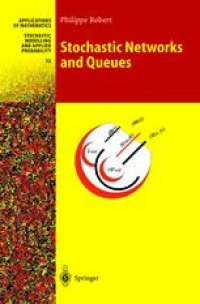
Ebook: Stochastic Networks and Queues
Author: Philippe Robert (auth.)
- Tags: Probability Theory and Stochastic Processes, Operations Research Management Science
- Series: Applications of Mathematics 52
- Year: 2003
- Publisher: Springer-Verlag Berlin Heidelberg
- Edition: 1
- Language: English
- pdf
Queues and stochastic networks are analyzed in this book with purely probabilistic methods. The purpose of these lectures is to show that general results from Markov processes, martingales or ergodic theory can be used directly to study the corresponding stochastic processes. Recent developments have shown that, instead of having ad-hoc methods, a better understanding of fundamental results on stochastic processes is crucial to study the complex behavior of stochastic networks.
In this book, various aspects of these stochastic models are investigated in depth in an elementary way: Existence of equilibrium, characterization of stationary regimes, transient behaviors (rare events, hitting times) and critical regimes, etc. A simple presentation of stationary point processes and Palm measures is given. Scaling methods and functional limit theorems are a major theme of this book. In particular, a complete chapter is devoted to fluid limits of Markov processes.
Queues and stochastic networks are analyzed in this book with purely probabilistic methods. The purpose of these lectures is to show that general results from Markov processes, martingales or ergodic theory can be used directly to study the corresponding stochastic processes. Recent developments have shown that, instead of having ad-hoc methods, a better understanding of fundamental results on stochastic processes is crucial to study the complex behavior of stochastic networks.
In this book, various aspects of these stochastic models are investigated in depth in an elementary way: Existence of equilibrium, characterization of stationary regimes, transient behaviors (rare events, hitting times) and critical regimes, etc. A simple presentation of stationary point processes and Palm measures is given. Scaling methods and functional limit theorems are a major theme of this book. In particular, a complete chapter is devoted to fluid limits of Markov processes.
Queues and stochastic networks are analyzed in this book with purely probabilistic methods. The purpose of these lectures is to show that general results from Markov processes, martingales or ergodic theory can be used directly to study the corresponding stochastic processes. Recent developments have shown that, instead of having ad-hoc methods, a better understanding of fundamental results on stochastic processes is crucial to study the complex behavior of stochastic networks.
In this book, various aspects of these stochastic models are investigated in depth in an elementary way: Existence of equilibrium, characterization of stationary regimes, transient behaviors (rare events, hitting times) and critical regimes, etc. A simple presentation of stationary point processes and Palm measures is given. Scaling methods and functional limit theorems are a major theme of this book. In particular, a complete chapter is devoted to fluid limits of Markov processes.
Content:
Front Matter....Pages i-xix
Point Processes....Pages 1-27
GI/GI/1 FIFO Queues and Random Walks....Pages 29-56
Limit Theorems for GI/GI/1 Queues....Pages 57-77
Stochastic Networks and Reversibility....Pages 79-101
The M/M/1 Queue....Pages 103-140
The M/M/? Queue....Pages 141-175
Queues with Poisson Arrivals....Pages 177-206
Recurrence and Transience of Markov Chains....Pages 207-229
Rescaled Markov Processes and Fluid Limits....Pages 231-278
Ergodic Theory: Basic Results....Pages 279-302
Stationary Point Processes....Pages 303-329
The G/G/1 FIFO Queue....Pages 331-350
Back Matter....Pages 351-399
Queues and stochastic networks are analyzed in this book with purely probabilistic methods. The purpose of these lectures is to show that general results from Markov processes, martingales or ergodic theory can be used directly to study the corresponding stochastic processes. Recent developments have shown that, instead of having ad-hoc methods, a better understanding of fundamental results on stochastic processes is crucial to study the complex behavior of stochastic networks.
In this book, various aspects of these stochastic models are investigated in depth in an elementary way: Existence of equilibrium, characterization of stationary regimes, transient behaviors (rare events, hitting times) and critical regimes, etc. A simple presentation of stationary point processes and Palm measures is given. Scaling methods and functional limit theorems are a major theme of this book. In particular, a complete chapter is devoted to fluid limits of Markov processes.
Content:
Front Matter....Pages i-xix
Point Processes....Pages 1-27
GI/GI/1 FIFO Queues and Random Walks....Pages 29-56
Limit Theorems for GI/GI/1 Queues....Pages 57-77
Stochastic Networks and Reversibility....Pages 79-101
The M/M/1 Queue....Pages 103-140
The M/M/? Queue....Pages 141-175
Queues with Poisson Arrivals....Pages 177-206
Recurrence and Transience of Markov Chains....Pages 207-229
Rescaled Markov Processes and Fluid Limits....Pages 231-278
Ergodic Theory: Basic Results....Pages 279-302
Stationary Point Processes....Pages 303-329
The G/G/1 FIFO Queue....Pages 331-350
Back Matter....Pages 351-399
....